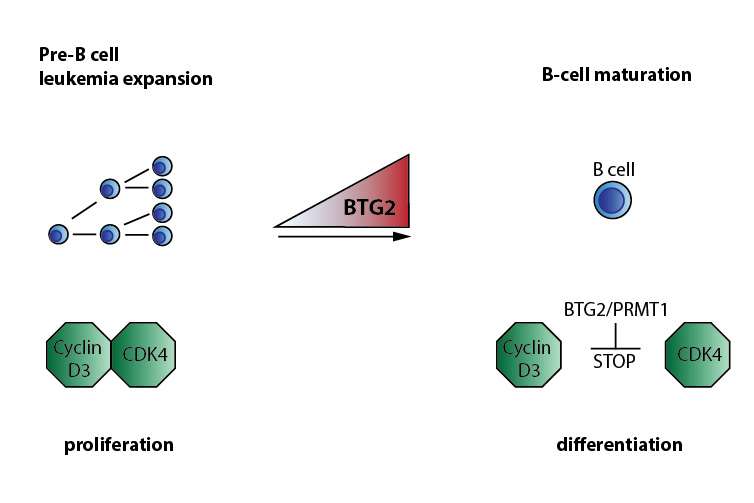Researchers show how a protein prevents the uncontrolled expansion of immune cells

The mammalian immune system consists of millions of individual cells that are produced daily from precursor cells in the bone marrow. During their development, immune cells undergo a rapid expansion, which is interrupted by phases of differentiation to more mature lymphocytes. Alternate phases of proliferation and differentiation occur also during the maturation of antibody-producing B cells. Researchers in Prof. Dr. Michael Reth's laboratory have come one step closer to understand how the proliferation to differentiation switch in B lymphocytes works, thereby providing new insights into the development of the most common types of tumors in children and potential therapies thereof.
The team has published its study in the journal Nature Immunology.
Because the switch induces differentiation, it limits the proliferation phase of precursor cells, so-called pre-B cells. If differentiation is blocked, pre-B cells continue to proliferate and this can lead to pre-B cell leukemia. The researchers have shown that the switch factor is a complex with two components: a small adaptor protein called B cell translocation gene 2 (BTG2) and the protein arginine methyl transferase 1 (PRMT1). "We found that BTG2 is up-regulated upon pre-B cell differentiation and that an induced expression of BTG2 in pre-B cells stops their proliferation," explains Dr. Elmar Dolezal, the first author of the published paper. How the BTG2/PRMT1 complex stops pre-B cell proliferation was shown by Dr. David Medgyesi: once activated by BTG2, PRMT1 specifically methylates the protein CDK4, thereby preventing its function in the cell cycle and further cell proliferation.
Interestingly, many tumor cells have either deleted the BTG2 gene or have silenced it. For example it is hardly expressed in B-Cell acute lymphoblastic leukemia (B-ALL), the most common type of cancer in children. Using a mouse model, the authors of the study have shown that reintroducing BTG2 in such B-ALL tumor cells prevents further tumor development. "We have discovered how BTG2 works as a tumor suppressor in pre-B cells and this may help to better understand and possibly develop a better treatment of B-ALL tumors," summarizes Reth. "It will be important in the future to explore the exact mechanisms for expression and regulation of the BTG2 gene and to find ways in which we can introduce BTG2 in B-cell tumors to patients and thereby block the tumor cells' proliferation."
More information: Elmar Dolezal et al. The BTG2-PRMT1 module limits pre-B cell expansion by regulating the CDK4-Cyclin-D3 complex, Nature Immunology (2017). DOI: 10.1038/ni.3774




















